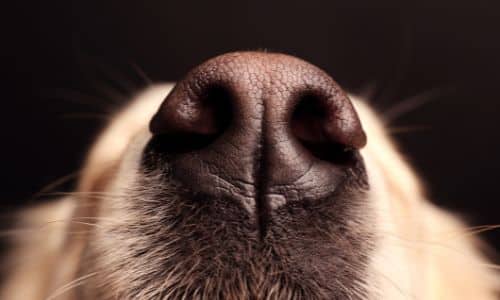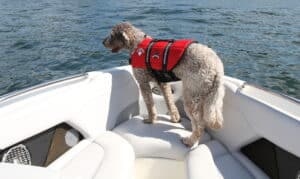
You care for your pup, and if their nose is dry and cracked, it can make for a scary surprise. There’s a crust flaking, and it may even look inflamed, red, or irritated. But there’s no need to panic! Completely normal and natural reasons often cause a dry and flakey nose. To ease your worry, this article will review the most common reasons why your dog’s nose is dry and how to treat it.
They’re Dehydrated or Exercised Too Much
The most common culprit of a dry nose is dehydration. Your dog’s nose can dry out from not having enough moisture, so give them plenty of access to fresh, clean water. This dehydration can also occur if they’re exercising too much. All that majestic running with the wind can make your dog’s nose rough and crackly.
Their Nose Didn’t Like the Weather Change
If you live in an area where it gets very warm or very cold, the heat and dry air can have an effect on your pup’s nose. This is even more so if it’s windy, as the air can suck the moisture right out of the sensitive, exposed skin. Monitoring how much they go outside or keeping them away from vents and fans will keep their nose from getting cracked.
Your dog’s nose can even get sunburned if they’re outside for too long. Pink noses are often the most susceptible to sunburn. This is easily remedied with sunscreen for dogs. It’s recommended that you don’t use a human sunscreen brand, as they can contain additives that are harmful to the skin of your dog’s nose.
They’re Getting Older or They’re a Brachycephalic Breed
Sometimes a dry nose is simply a sign of your pup getting older. This could be because they’re sleeping more and therefore not licking their nose as often as they need to. Or it could be because it’s just a natural part of the aging process, just like their gray hairs.
Brachycephalic breeds, like Pugs, Boxers, Boston Terriers, and French Bulldogs, all have short skulls and pushed-in noses. Therefore, they often have difficulty breathing and licking their own nose.
If your pup is old or brachycephalic, a simple nose balm for dogs should do the trick if applied correctly and consistently.
Signs It’s Something More
Occasionally, a dry nose can mean something more. Allergies are one of the more common illnesses that makes a dog’s nose dry and is often accompanied by sneezing, runny nose, itchiness, and swelling of the lips, eyelids, earflaps, or face.
Autoimmune diseases, such as Lupus, can also make a dog’s nose dry. If your dog’s dry nose is accompanied by lethargy, lack of appetite, vomiting, or diarrhea, get them to a vet as soon as you can.
Usually, the reasons why your dog’s nose is dry and their treatments are simple. If you stay aware of your dog’s habits and behaviors, they should be just fine.





